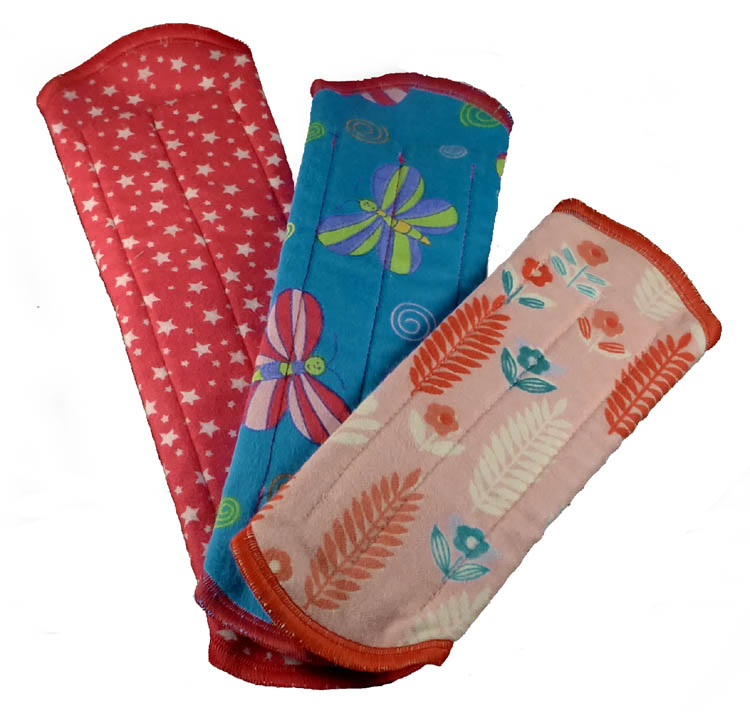Reusable pads – an environmental choice.
As well as being an economical choice and a wonderful way of caring for yourself, choosing Wemoon’s reusable sanitary pads is a very positive step in caring for our planet.
There are a number of problems associated with the production, packaging and disposal of disposable feminine hygiene products. At Wemoon we believe that the cost to our environment of these products is simply too great. The sheer quantity of precious resources, the magnitude of the resulting waste, and the threat to the environment of the chemicals used in the industry are our main areas of concern.
“Disposable” sanitary waste clogs sewers and landfill
Did you know?
An average woman throws away 10 – 15,000 tampons, pads and applicators in her lifetime. The great majority of these are sent to landfills, or pass through sewage treatment plants and end up in the oceans, choking fish and washing up on beaches 1.
In the US and Canada over 12 billion sanitary pads and tampons are “disposed of” each year. In Australia and New Zealand the figure is well over 700 million tampons and 1 billion pads and every single day in the UK, approximately 2.5 million tampons, 1.4 million sanitary towels and 0.7 million panty liners are flushed down the toilet 2. That’s an awful lot!
Using reusable pads gives you the great feeling that you are no longer contributing to these statistics but playing your part in reducing the pollution of our planet.
Over use of our precious natural resources
Did you know? Tampons are made from either cotton, or a mixture of cotton and rayon. The use of cotton raises issues of fair trade, pesticide  use and genetic modification 2,3. No less than 170 insecticides are registered for use on cotton crops, and the bleaching process for cotton involves formaldehyde, which has its own share of unpleasant effects on the planet.
use and genetic modification 2,3. No less than 170 insecticides are registered for use on cotton crops, and the bleaching process for cotton involves formaldehyde, which has its own share of unpleasant effects on the planet.
Disposable sanitary towels and panty liners are also made mostly from heavily bleached wood pulp from wood pulp from our ever-decreasing forests. The world’s forests are also the lungs of the planet, performing a vital role in converting carbon dioxide back into oxygen. The overuse of paper products and the constant demand for wood pulp is a serious threat to the well-being of the planet’s eco-system.
Dioxin and related chemicals pose a serious environmental threat.
Did you know? In order to promote the whiter-than-white, sterile image disposable feminine hygiene products are heavily bleached and treated. Elemental chlorine gas has been a common bleaching agent. This is a source of dioxin, a known human carcinogen. 4 Dioxin is 70,000 times more lethal than arsenic and next to plutonium the most toxic substance known to humans. Since an environmental campaign in Great Britain persuaded UK manufacturers to change the bleaching method many now use either chlorine dioxide or hydrogen peroxide. As a result of this and reduced use of chlorine in other processes, dioxin levels in the environment are tending to fall.
However, dioxins are still occasionally detectable, in trace amounts, in mill effluents and pulp.5
The Wemoon Way
Using Wemoon reusable pads you can actually contribute positively to the  eco-balance. Menstrual blood has been know for centuries as a powerful source of valuable nutrient. We recommend that you soak your pads before washing and return your pad-soaking water to the soil, giving much-needed nutrients back to Mother Nature.
eco-balance. Menstrual blood has been know for centuries as a powerful source of valuable nutrient. We recommend that you soak your pads before washing and return your pad-soaking water to the soil, giving much-needed nutrients back to Mother Nature.
Wemoon pads are packaged in cellophane bags. Cellophane is derived from plants. Unlike plastic you can tear it by hand and is 100% biodegradable.
The labels are 100% recycled paper and we use 100% recycled for all paperwork in our office.
References:
1. According to the US Center for Marine Conservation, over 170,000 tampon applicators were collected along U.S. coastal areas between 1998 and 1999.
2. World Health Organisation Factsheet No 225, ‘Dioxins and Their Effects on Human Health’ June 1999
3. US Food & Drug Administration, ‘Tampons and Asbestos, Dioxin & Toxic Shock Syndrome’; July 1999


